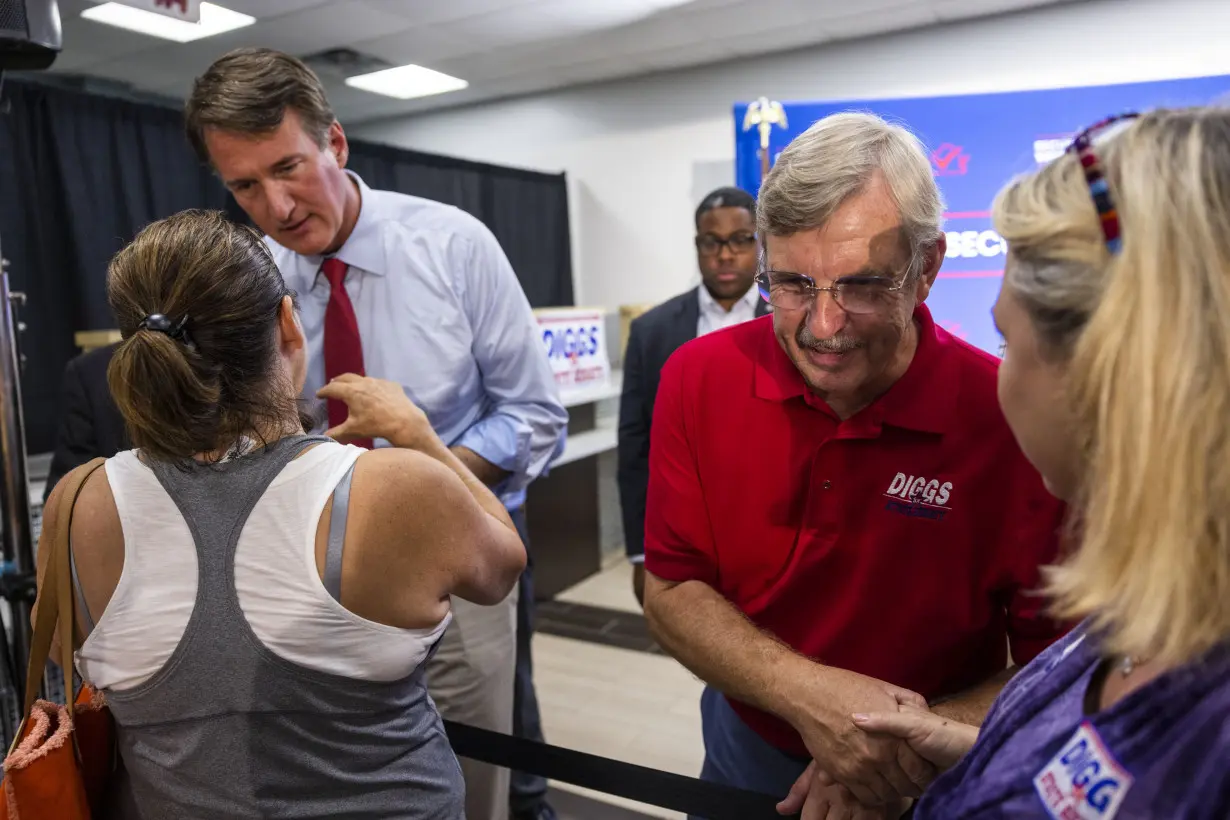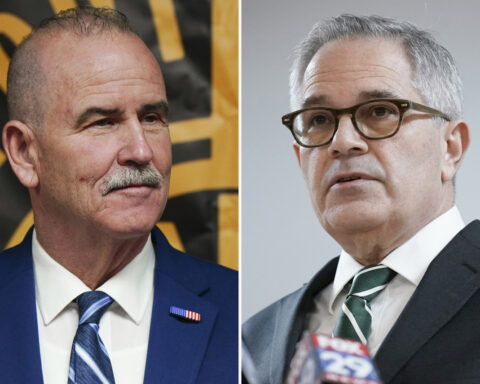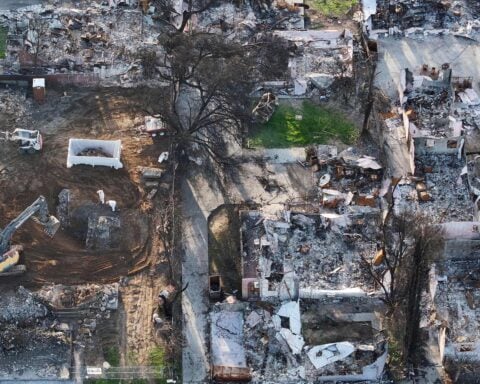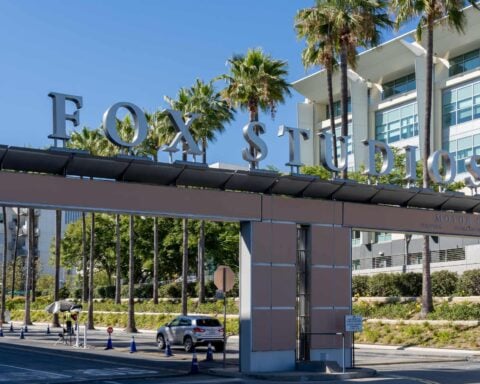WASHINGTON (AP) — Although his name won't appear on the ballot, Republican Gov. Glenn Youngkin looms large over Tuesday's general election in Virginia.
Republicans hope to gain full control of the state legislature and clear a path for the governor to enact his proposals on abortion, education, taxes and other key policy priorities. Democrats seek to maintain control of at least one chamber and possibly flip the other to continue to serve as a check against Youngkin's agenda.
In 2021, Republicans won a narrow 52-48 majority in the House of Delegates and swept every statewide constitutional office. Meanwhile, Democrats hold a slim 22-17 majority in the state Senate. An additional state Senate seat most recently held by a Republican is vacant.
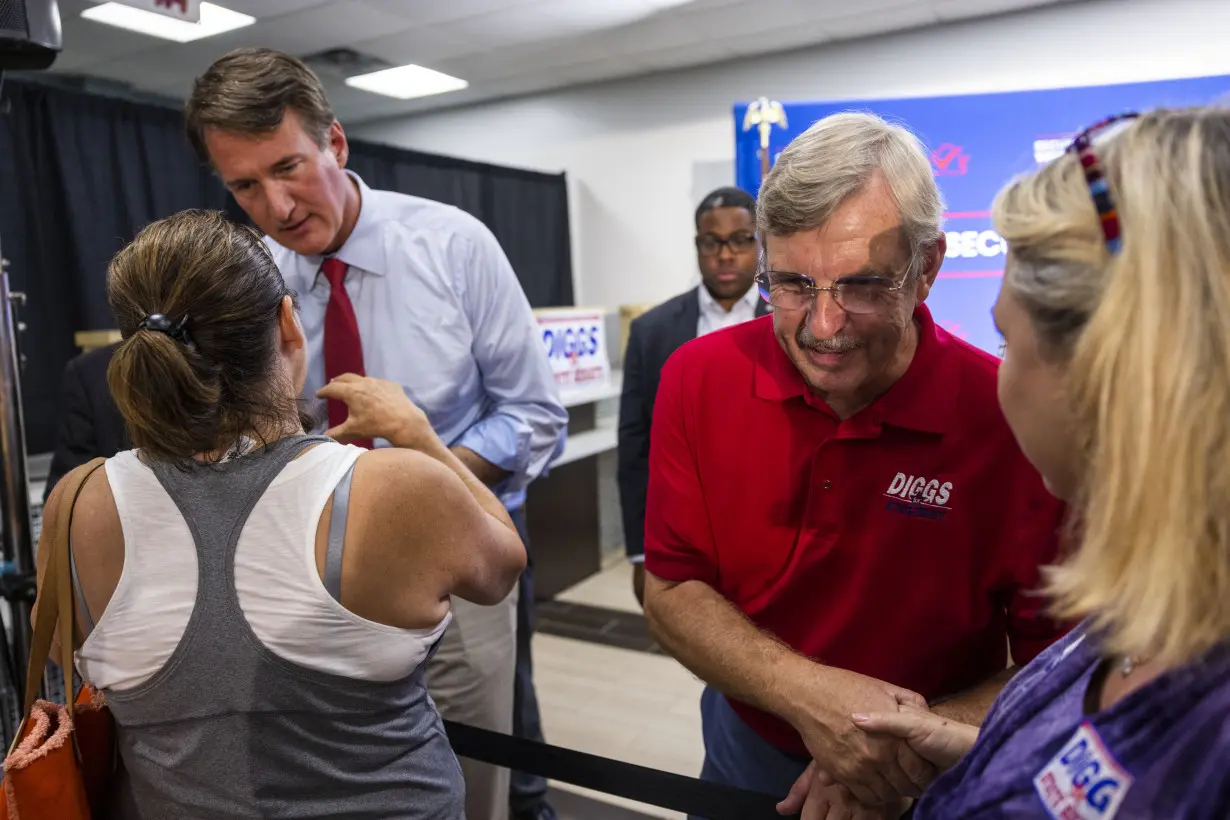
The governor has been active on the Virginia campaign trail. Since his election in 2021, his political action committee has spent $19 million on contributions to legislative candidates, local party committees and other campaign expenses. And as he possibly mulls a late entry into the 2024 presidential race, the outcome of Tuesday's election could be interpreted as a referendum on Youngkin himself.
All 40 state Senate seats and 100 state House seats will be on the ballot, but the balance of power will likely be determined by a handful of competitive districts in northern Virginia near Washington, D.C., central Virginia near Richmond and southeast Virginia in the Hampton Roads area.
In the state Senate, Democrats face competitive races in the four districts that voted for Democrat Joe Biden for president in 2020 but then supported Youngkin the following year.
In District 24, which includes Yorktown and Newport News, incumbent Democratic state Sen. Monty Mason is running for reelection against Republican Danny Diggs, the former longtime York County sheriff. Also in the Hampton Roads area, Democrat Clinton Jenkins faces Republican Emily Brewer for the open seat in District 17, along the eastern North Carolina border.
Further north in Fredericksburg, Democrat Joel Griffin and Republican Tara Durant are competing for the open seat in District 27. In northern Virginia, Democrat Russet Perry and Republican Juan Pablo Segura face off in District 31, an open seat covering parts of Loudoun and Fauquier counties in the outer Washington suburbs.
In District 16 just northwest of Richmond, incumbent Republican state Sen. Siobhan Dunnavant faces a challenge from Democrat Schuyler VanValkenburg in an area carried by Biden in 2020 and by former Democratic Gov. Terry McAuliffe in his unsuccessful 2021 reelection bid.
In the state House, incumbent Republican state Sens. Kim Taylor in District 82 in Petersburg and Karen Greenhalgh in District 97 in Virginia Beach face strong Democratic challenges.
There are also competitive races in three open seats: District 21 in northern Virginia, District 57 northwest of Richmond and District 65 in Fredericksburg. All five seats are in districts that went for Biden in 2020 and Youngkin in 2021.
Regardless of the outcome of the election, the legislature will see more turnover than usual resulting from a new set of district maps that prompted a record number of retirements and incumbents defeated in the June primary.
Other notable contests Tuesday are a ballot measure in Richmond authorizing a casino and the race for commonwealth’s attorney in Loudoun County.
Here’s a look at what to expect on election night:
ELECTION DAY
The Virginia general election will be held on Tuesday. Polls close statewide at 7 p.m. ET.
WHAT’S ON THE BALLOT?
The Associated Press will provide coverage for 106 contests in Virginia, including 35 in the state Senate, 68 in the House of Delegates, two commonwealth's attorney races in Fairfax and Loudoun counties and a ballot measure in Richmond on authorizing a casino. All 40 state Senate seats and 100 state House seats are up for election this year, but several seats in both chambers are uncontested.
WHO GETS TO VOTE?
All registered voters in Virginia are eligible to vote in Tuesday’s general election. The deadline to register for a regular ballot was Oct. 16. Anyone who registered after the deadline will be given a provisional ballot, and eligibility will be determined by elections officials after Election Day.
DECISION NOTES
Normally in legislative elections, a key analytical tool in making race calls is comparing the current election night vote result with previous election results for the same contest. Since this is the first election held under these new boundaries, past Senate and House results are not a meaningful point of comparison. However, district level results from the 2020 presidential race and the 2021 gubernatorial race do provide a general sense of each district’s partisan voting history.
Virginia reports results by vote type, including Election Day, early in-person and mail-in ballots. In competitive races, the AP will evaluate whether results are consistent across vote types. If there are significant differences, a call may not be made until more votes are available from each vote type.
The AP does not make projections and will declare a winner only when it’s determined there is no scenario that would allow the trailing candidates to close the gap. If a race has not been called, the AP will continue to cover any newsworthy developments, such as candidate concessions or declarations of victory. In doing so, the AP will make clear that it has not yet declared a winner and explain why.
Virginia does not conduct automatic recounts. Candidates may request and pay for recounts if the margin between the top two candidates is one percentage point or less. The government will pay for the recount if the margin is less than 0.5 percentage points or the final outcome has changed. The AP may declare a winner in a race that is eligible for a recount if it can determine the lead is too large for a recount or legal challenge to change the outcome.
WHAT DO TURNOUT AND THE ADVANCE VOTE LOOK LIKE?
As of Wednesday, there were 6,122,466 voters registered in Virginia. Virginia does not register voters by party.
As of Thursday, more than 618,000 voters had cast ballots before Election Day, 35% by mail and 65% in person.
In the 2022 general election, 32% of the vote was cast before Election Day. It was slightly higher in the 2021 general election for governor at 36%.
HOW LONG DOES VOTE COUNTING USUALLY TAKE?
In the 2022 congressional midterm general election, the AP first reported results in 10 of 11 congressional districts between 7:09 p.m. and 7:30 p.m. ET. In the 11th congressional district, the first votes were reported at 8:31 p.m. ET. By noon the day after Election Day, 98% of the vote across all congressional districts had been counted.

 Trump has begun another trade war. Here's a timeline of how we got here
Trump has begun another trade war. Here's a timeline of how we got here
 Canada's leader laments lost friendship with US in town that sheltered stranded Americans after 9/11
Canada's leader laments lost friendship with US in town that sheltered stranded Americans after 9/11
 Chinese EV giant BYD's fourth-quarter profit leaps 73%
Chinese EV giant BYD's fourth-quarter profit leaps 73%
 You're an American in another land? Prepare to talk about the why and how of Trump 2.0
You're an American in another land? Prepare to talk about the why and how of Trump 2.0
 Chalk talk: Star power, top teams and No. 5 seeds headline the women's March Madness Sweet 16
Chalk talk: Star power, top teams and No. 5 seeds headline the women's March Madness Sweet 16
 Purdue returns to Sweet 16 with 76-62 win over McNeese in March Madness
Purdue returns to Sweet 16 with 76-62 win over McNeese in March Madness
